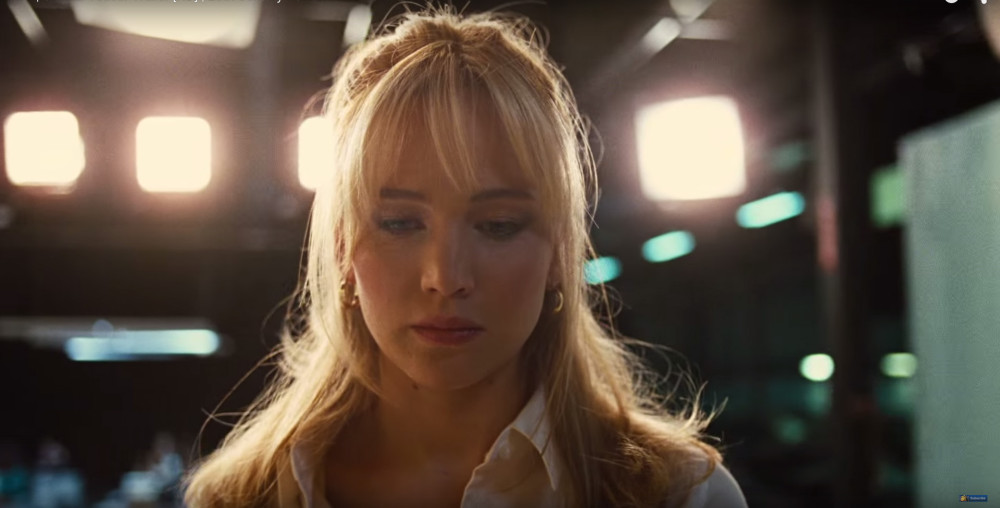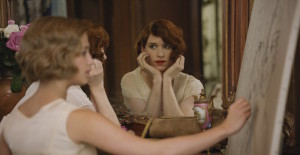
Making a movie about the inventor of the miracle mop might not sound like a commercial idea (which is why the marketing team has completely buried this key plot detail from all the trailers and posters) but in the hands of David O. Russell and Jennifer Lawrence it becomes a modern fairy tale full of oddities, dream sequences and a family of (almost) complete fuck-ups. Ah, the fuck-ups! From Spanking the Monkey right up to 2013’s American Hustle, O. Russell has built an eclectic career out of depicting lovable fuck-ups on screen. It’s one of the things that make his movies worthwhile. People are allowed to be devastatingly flawed in a David O. Russell movie and they don’t need to overcome their flaws to be accepted by the film’s end. In fact, the journey of an audience for an O. Russell film is usually about accepting a character for who they are in order to find satisfaction in their resolution. So if there’s one thing that sets his latest film apart from those that came before it, it’s this; Joy Mangano might be the least fucked up character David O. Russell has ever made a movie about.
Whether you like O. Russell or not, it’s clear that he is in love with his characters. His films can be messy, unfocused and sometimes frustrating, but the faces he puts on screen and the details he pays attention to are very unique, even in a minor work like Joy. The main reason I look forward to a new David O. Russell movie is because of the people I’m going to meet within it. I’ve yet to see a romantic comedy this decade that comes close to Silver Linings Playbook. The way the ensemble works together in that movie is remarkable. With Lawrence and Cooper at the centre there’s a sense that anything could happen. It’s not often you feel true danger in a modern love-story, but by focusing in on two highly volatile individuals (or fuck-ups) like Pat and Tiffany, the film breaks new ground. Even if, like me, you find The Fighter and American Hustle increasingly average as the years go, you might feel a need to revisit those films in order to spend more time with the characters. I like those people. They fascinate me. The same goes for the fuck-ups in his new movie.
While Joy might be about a single person by name (we’ll get to her in a minute), the film boasts yet another colorful David O. Russell ensemble. Virginia Madsen plays Joy’s mother Terri, a depressed house-wife who spends most of her time bed-ridden obsessing over soap operas. Robert De Niro plays her ex-husband and Joy’s hot-headed father Rudy, who at the start of the film arrives at Joy’s home asking for a place to stay and ends up sharing the basement with her ex-husband Anthony, a struggling lounge singer played by Edgar Ramirez. If all of this sounds like the perfect set-up for a grand farce, you’re not mistaken. Early on O. Russell thrives off of packing as many of these characters into a frame as he can, letting them bounce off of one another with raised voices and scrappy quarrels. The only source of even-headed tranquility comes from Joy’s grandmother Mimi (Diane Ladd) who watches all from her bedroom upstairs and provides Joy with wisdom and advice. While the Mangano’s might be the frontrunners for 2015’s most dysfunctional family award and O. Russell’s treatment of them is borderline caricature, somehow they ring true. They give the film a necessary chaos to offset the drive and determination anchored by the woman at the heart of it all.
Jennifer Lawrence doesn’t need to remind us that she’s a bonafide movie star but she does it anyway, every damn time she’s on screen. The girl can’t help it. The first time she appears in Joy the film suddenly lifts and brightens, her presence makes the film immediately exciting. There’s something about watching a young actor blossoming into greatness during their early years. They push themselves in new directions to see where they flourish and where they flounder. Their careers are unpredictable and the art of surprise is still very much on their side. Lawrence might already have a Best Actress statue under her belt but by no means has she peaked. From her previous collaborations with O. Russell you’d be forgiven for expecting another firey hellcat performance but Joy showcases a new caliber all together. As Joy Mangano, Lawrence gets to channel her inner Michael Corleone and become the film’s cool, concentrated centre. This is the woman who went from being a struggling mother-of-two, working as an Airline booking clerk, to inventing a revolutionary household mop using materials from her father’s metal yard to build a prototype. Many of the best moments stem from simply watching Lawrence quietly observe those around her. She picks her fights carefully and her words even more so. At a certain point in the movie, her nutball family stops talking over her and start listening. When she speaks you’ll find yourself inching forward in your chair to catch every syllable, as in one memorable showdown with her overbearing sister Peggy (Elisabeth Rohm) who has almost derailed the Miracle Mop empire before it has had chance to take off. We’ve never seen Lawrence play it this quiet, at least not this mature. With Joy the girl who wowed us all so vividly in Winter’s Bone has finally become a woman.
When Bradley Cooper’s shifty QVC exec enters the story, the film builds towards its centerpiece. Following a failed QVC plug due to a useless salesman, Joy takes it upon herself to go on the show personally in order to demonstrate what sets the Miracle Mop apart from the competition. Lawrence’s performance here, at first a deer in headlights facing impending disaster before transitioning into a crackerjack saleswoman live on air, is so good that I actually fist-pumped the air for her. As this sequence unfolds and arrives at it’s climax, the film reaches a level of euphoria I had no idea it was even capable of. This is Joy’s Rocky moment. It’s where you realize you actually give a shit about these people and want nothing more than to see them succeed. I live for those moments in movies, where you realize the filmmakers have you hook, line and sinker.
Looking at Joy’s middling critical response I actually wondered if I had seen the same film everyone else had. While this is certainly a minor work from all those involved (as good as Lawrence is it feels like a transition performance as opposed to a defining one), it is a far more experimental and individual movie than many have given it credit for. The bloat and structure-less void that bogged down American Hustle has been dialed back and O. Russell keeps his film focused and dialed in for the most part. He allows for some bold-brush-stroke asides early on such as a dream-sequence that plants Joy in the soap operas her Mother binges endlessly on, but this adds some welcome, if unexpected, flavor. I think the problem comes from the fact that Joy is being presented as some kind of lavish prestige picture, when really it’s just a small-scale underdog story that feels more tuned to leftfield sensibilities rather than that of the mainstream.
Russell tries as hard as he can to avoid any gritty “True Story” clichés by dressing this little rags to riches story in as many bright colors and as much lavish design as possible. If you have ever wondered what a David O. Russell feel-good movie looks like, you’ve finally got your answer. With it’s cast of seasoned pros and headlining performance by one of our brightest young leading ladies, Joy is rarely a chore to sit through. The film might work more in it’s individual scenes rather than as a whole but when the whole looks this odd and eclectic it doesn’t matter too much. Even minor works, with their inherent flaws and exceeding grasps, can be as equally rewarding, sometimes more so, than movies with a 90+ percent fresh rating on Rotten Tomatoes. If somebody forced me to watch either Carol or Joy ten times in a row, I know which one I’d pick. Hint: It’s the one with the mop.
—
Directed by David O. Russell; written by David O. Russell; starring Jennifer Lawrence, Robert, De Niro, Bradley Cooper, Virginia Madsen, Edgar Ramirez, Diane Ladd, Elisabeth Rohm, Isabella Rossellini; 124 minutes.
Joy is in cinemas everywhere now.



 Derek
Derek
 Isabelle
Isabelle